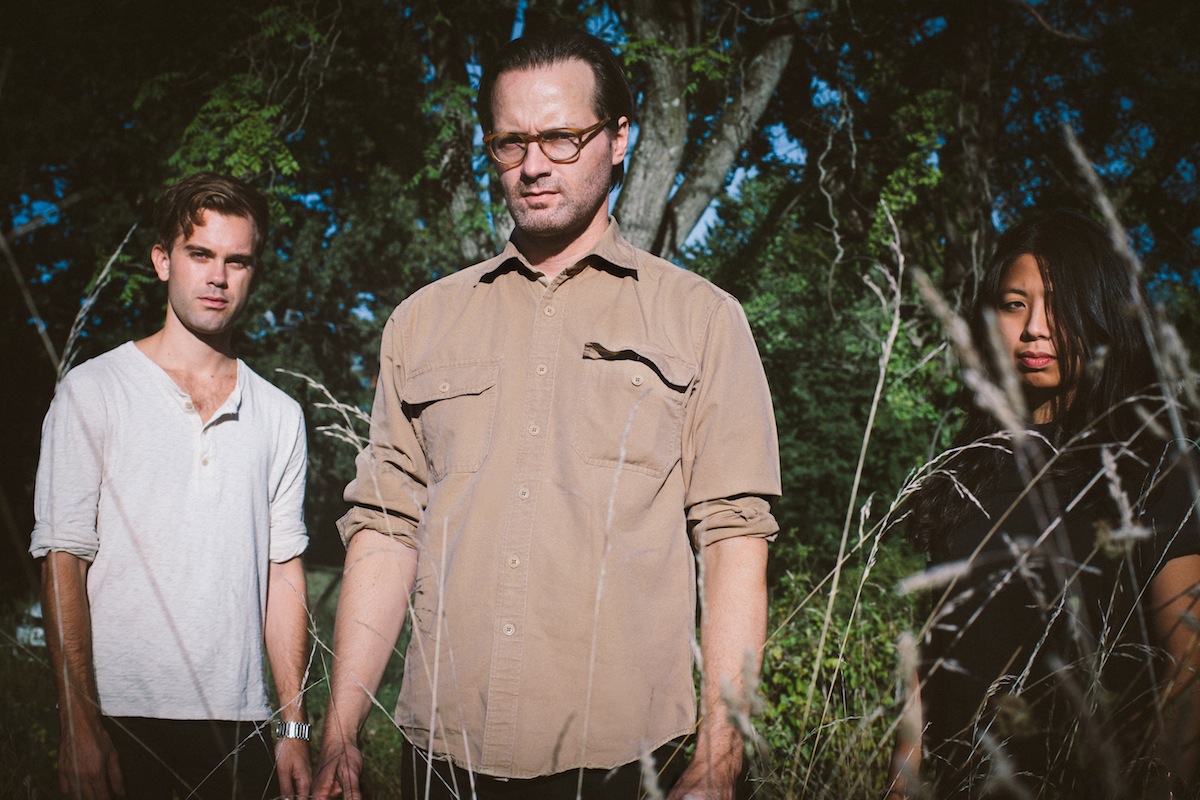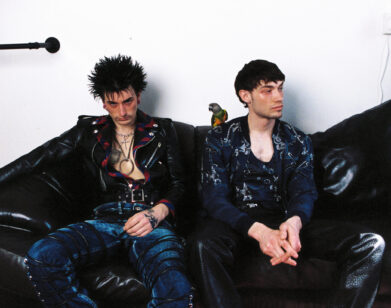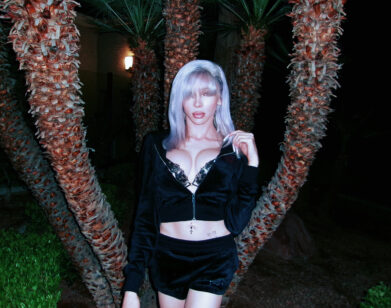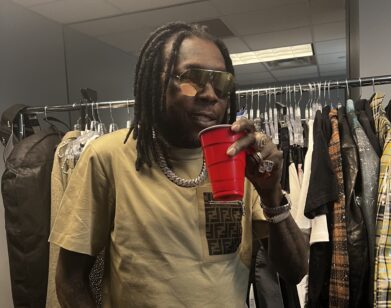Forma’s Ideals

ABOVE: FORMA
In Latin, forma means a shape or figure, but it is also a word to describe beauty. The implication is that the simplicity of form and structure in themselves is the essence of grace. Coming out of Brooklyn, the band Forma has personified this ideal with their two releases, first a self-titled LP and now OFF/ON, both on the Spectrum Spools imprint of Editions Mego (run by John Elliott of the group Emeralds). The records are works of clarified synthetic orchestration. Well-placed, elegant tracks, rooted in improv, lead the listener through arpeggiated tunnels of sound.
The threesome—George Bennett, Mark Dwinell, and Sophie Lam—use many different vintage synthesizers to weave their fabric, resulting in warmer tones than you often find with electronic music. The warmth is echoed in the group’s demeanor and their practice space, which is a large, repurposed school in Bushwick with vaulted ceilings and a stage in the main room. We met there to chat on a crisp, sunny Saturday morning; a large black cat, one of the building’s residents, loudly intervened.
ARI SPOOL: Mark and Sophie live in the Schoolhouse, and then George, you don’t?
GEORGE BENNETT: Sometimes I feel like I do.
SPOOL: And you guys practice here?
MARK DWINELL: This is our studio.
BENNETT: All the gear is at my place right now, though. This is what we don’t bring to shows. Usually this room is a mess of wires.
SPOOL: [gestures to a mass of musical equipment] This is what you don’t bring to shows?
DWINELL: These are the big synths that are sort of heavy to bring around these days. But we do all our recording in here.
SPOOL: Do you feel like this space influenced the grandness of the sound? Because I figured you would practice out in the larger area.
DWINELL: We used to.
SPOOL: Do you think that’s an influence?
DWINELL: Maybe? Not exactly directly. [to Sophie] I don’t know, what would you say?
SOPHIE LAM: Yeah, I’d say that actually it’s a good metaphor. We went from being more jammy and free-form to being tighter, and even the formation of how we set up has changed. We used to be this inward-facing semi-square, and now we set ourselves across the stage. I think we’re much more in our world, as opposed to outside pushing outwards.
BENNETT: Most of the first record was recorded in the main space. The second record was recorded in here. But we also used to practice on the top floor, so we’re just kind of spiraling around the house.
LAM: It’s definitely fun to play loudly here.
SPOOL: The ultimate freedom, in your own home!
LAM: Totally.
DWINELL: Lots of options, but there’s something about being private, you know? Not having roommates walking by in their bathrobes. More conducive.
SPOOL: When you think about music as being an expressive force—do you then try to shape a particular concept, or expression? What are the kinds of expression that you’re hoping that the audience hears in your music?
DWINELL: When we make records, one thing that I’m interested in is a variety of emotional states. We don’t have a singer. We don’t have a message. We don’t sing songs. So it’s all in the music. When we make records, it’s about lining up different emotional states to create a record. I don’t know exactly how to put it, but there’s definitely consideration in the process that we recorded with. Like, “Oh, we’ve got a couple of minor-y songs, a little slower. Maybe we need something more upbeat.”
LAM: I guess emotional contrast is what we’re striving for. You can take that as concretely or abstractly as you want. Even in our live sets we’re exploring a dynamic range of—I hope—feelings. Through tempo, through keys, through how jammy and improvisational or how tightly structured a piece may be.
BENNETT: There’s a limit to how much we can deliberately try to express conceptually because we improvise. A lot of times when we are going into stuff we have no idea what’s coming out. That probably ultimately helps the emotional expression be more direct or earnest, because we’re just channeling whatever’s going on.
SPOOL: Is it a more honest process to make music by than one where you compose in advance? As opposed to saying, “I want to write a song about blank, and I am going to think synthetically and compositionally about what sort of keys and tones would express this.” Instead of that, do you think that improvising a composition is more honest than trying to compose based on premeditation?
BENNETT: I don’t think honest is the right word. It’s our process, and I think it’s just our collective reaction to the musical and cultural landscape we find ourselves in. We choose to work within a set of parameters, we choose a certain method and a process. It’s not a position that’s meant to be antagonistic to some other mode, or even referential to another, more deliberate mode. We never come at it from the angle that somehow, we’ve liberated ourselves from certain dishonesties or artificialities that enable us to speak more directly.
SPOOL: I think artificiality is a real question when dealing with synthesized and electronic music.
LAM: I would say we just try to keep things spontaneous. Even if we are more formally composing a song, I don’t think that improvisational possibilities are not limited to, as George was saying, the parameters we’ve set. I don’t think it’s so black and white. It’s not improv versus compositional structure, for us at least, because we’re not dealing in such concrete things like having to match lyrics to a song, or something like that. On our record, our pieces are a certain amount of time, because they have to be. They’re limited by the format. But when we play on stage, it can be as long or as short as we want to. That’s the beauty. It can start and stop whenever. It’s what we’re feeling, and how we’re communicating to each other.
BENNETT: I think the instrumentation that we use turns the whole artificiality/organic thing completely on its head, because when I think of these instruments, I can’t think of anything more organic or natural than these relics of some technological time and place. It’s funny to think that an instrument that was born to emulate something organic now has a sound that’s prized for its uniqueness and its non-referentiality to—an actual drum, for instance.
DWINELL: Whereas, at the time, it was the closest they could get to the sound.
BENNETT: Like the Linn drum. It was like, “How do we get the sound of a natural instrument?” But in the process, they ended up defining this palette that’s really unique and expressive on its own terms.
DWINELL: I think another point would be that a huge degree of what’s on the record is live playing. Sophie and I have two free hands, and our setup is usually to have access to two, sometimes having a third synth or fourth synth. We might have as many as six synthesizers set up during some of these recordings. The idea of artificiality implies pre-programming, and arpeggiations, and, yes we utilize those. They are like the ground, and then Sophie, George and I have the freedom to move around on top of those.
BENNETT: There’s like two layers going on when we play. There’s this thing churning away on its own, and then there’s a level, kind of like the color, and there’s expressiveness that’s not contingent on this machine.
LAM: I can say this, right? Even, for instance, the first and last track on our first record, the sequence is exactly the same, but the pieces are completely different moods. That’s just an example of how you can take a foundation—
BENNETT: You blew our cover! [laughs]
LAM: I think people know! I mean, they are titled “237A” and “237B,” and there’s a reason for that. It’s the same piece!
DWINELL: But it’s 25 minutes long.
LAM: That jam went from here to there, and they are, in some ways completely different emotions.
OFF/ON IS OUT TOMORROW, NOVEMBER 20, ON SPECTRUM SPOOLS (EDITIONS MEGO). FOR MORE ON FORMA, VISIT THEIR WEBSITE.






